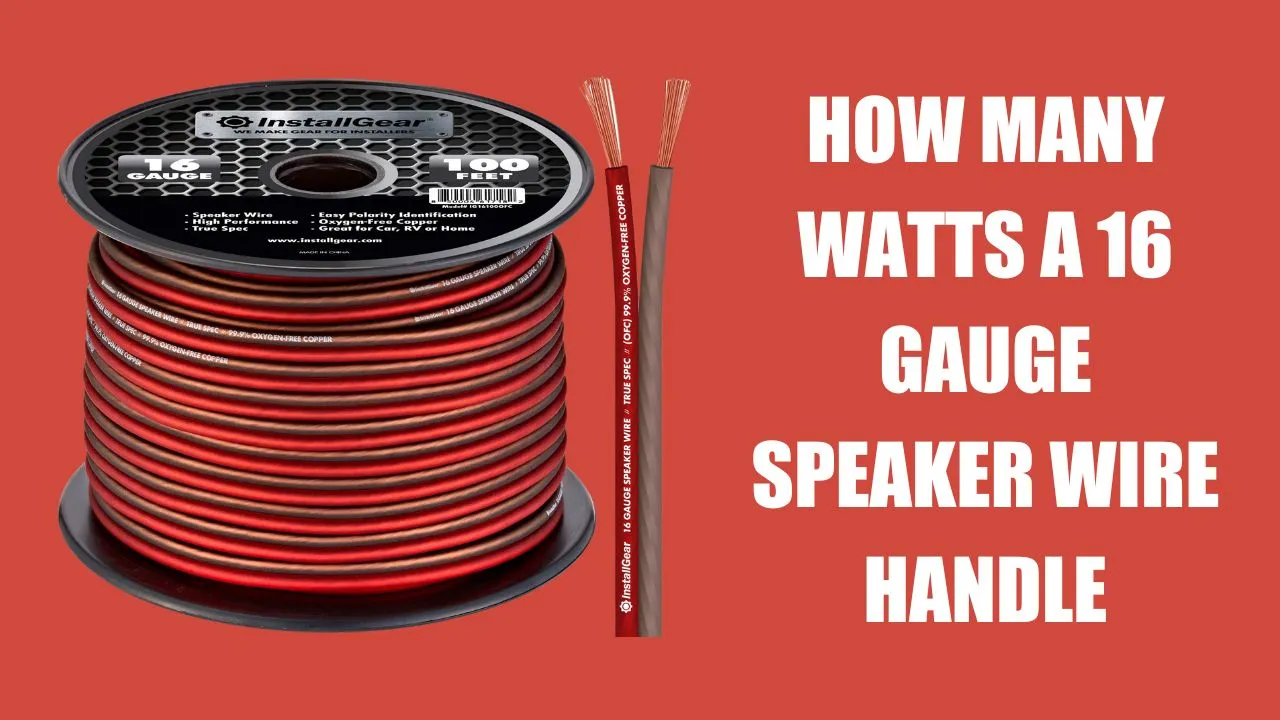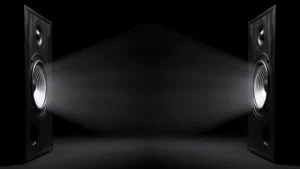A 16 gauge speaker wire can handle 50-watt to 100-watt of power. It is an amalgamation of shorter wires and better insulations that make it capable of handling higher watts. There are many factors that depend on how many watts a 16 gauge speaker can handle, such as the type of wire, insulation, temperature, and the ohms rating of the speaker.
If you are trying to find out whether a 16 gauge speaker wire would be good for you, then let’s get to the details through this guide. We will discuss the uses, the maximum load it can take, and all your queries.
In This Article:
How many watts can a 16 gauge speaker wire hold?
If you are using a 16 Gauge speaker wire, then it would be perfect for home stereo speakers or car speakers. This can run for a short time and handle 100 watts. However, if you are using it in a shorter length with low-power subwoofers, then the load can increase to 225 watts.
Now, if we talk about the sound quality of the stereo system, then both wattage and the wire length play a crucial role. So, you must select a wire gauge based on the necessity and also keep in mind the exact length that you need to maintain between the sound source and speaker.
If you are using the 16 gauge wire for your home stereos or car speakers, then it must have an impedance of 4, 6, or 8 ohms. And, if you are using it with 4-ohm speakers, then the 16 gauge can run up to 24 feet. For a 6-ohm speaker, it can run up to 36 feet, and for an 8-ohm speaker, it can run up to 48 feet.
So, whenever you are buying a 16 gauge speaker wire, you must always check the speaker weightage, impedance, packaging, manuals, etc. This would ensure that you get to hear your favorite audio without any interference and also experience good listening quality.
What are the factors to consider when choosing a 16-gauge wire for your speaker?
To select the perfect 16 gauge wire that will boost your speaker, you need to take care of certain factors such as:
Diameter and thickness
You need to understand the importance of the diameter and thickness of the speaker wire when you are selecting a wire gauge. There are different diameters available, starting from 12 gauge, 14 gauge, 16 gauge, and 18 gauge. The higher the gauge number, the more diameter or thickness the war has. On the contrary, if you find the diameter is bigger, then the gauge number would be low. So, you would find 12 gauge speaker wires are actually thicker than 16 gauge speaker wires.
Now, wire thickness and diameter define the overall resistance of the speaker circuit so that it can affect the audio output. Thus, you need to be careful about your choice.
Power output
Power output defines the power given out by your stereos or amplifier. It is also measured in “watts”. You can find the number mentioned in the speaker packaging. If you have noted down the power output of the speaker, then it becomes easier to look for the wire that would be suitable. Based on the uses, you can easily categorize the power output, and this would also help you to find the right wire gauge for other different speakers.
So, if you are using a car speaker, you need to attach it with a 16 gauge wire. But, if you are using the speaker for public places, then it will need to go with a 12 gauge wire.
Length
When you are setting up your speaker, speaker wire length is also very important. Try to measure the distance between your audio source and the speaker because a shortage of wire gauge would only indicate a waste of money. Also, you might know that the speaker wire depends on impedance rating as well as the speaker’s distance, so consider them.
Always remember that the wattage usually gets affected due to an increase in length or decrease in length. If the length increases, you will face much higher resistance which limits the power flow. On the other hand, the maximum length can increase based on increasing impedance rate. For example, you may find 24, 36, and 48 feet of 16 AWG speaker wire, where the impedance is 4, 6, or 8 ohms.
Material
Whenever you are buying speaker wire, keep a close note of the material as it would affect the audio output quality. It is best to go for copper wire because it is considered to be the best conductor in terms of speaker wire. At present many manufacturers are using different materials that, include Aluminium and copper-clad aluminum. So, if you can get copper wire, it should be your first priority, and it also helps to maintain the optimum sound quality
You can also go for copper-clad aluminum wire, but usually, they have a lower load-bearing capacity as they are made by using conductor-grade aluminum, and copper only forms the outer layer. You can also go for speaker wire made of oxygen-free copper. They would help to emit less energy loss and would also provide a smooth sound experience.
Restriction of power or impedance
First, check the speaker’s power output and then understand the restriction of power or impedance rating. You can measure it in terms of ohms. Actually, impedance indicates the restriction that the wire faces during the power flow. So, you can get a variant of speakers with both high and low impedance but always get the one that serves your purpose.
If you are using the speaker for home or car purposes, then get a low input and speaker. But, if you are using it for public places. Speakers with high impedance have better coil winding and help the sound travel farther. Also, check the speaker manual to understand the impedance level.
What are the different types of 16 gauge speaker wire?
You can divide 16 gauge speaker wires into 2 variance – Stranded and Solid Core 16 gauge speaker wires.
The Stranded speaker wire is made of small and thin pieces of wire which are twisted together, but Solid Core 16 gauge speaker wires are made of a heavy metal core.
If you are using a 16 gauge Stranded wire, then it provides you higher flexibility as it is made of smaller pieces that are twisted among themselves. You can use this for your home or car-based appliances
However, if you are looking for higher durability and wire that can perform even under extreme weather conditions and has resistance and frequent movement, then Solid Core 16 gauge speaker wire is the one that you should take.
Can you get an electrical shock from a 16-gauge speaker wire?
No, 16 gauge speaker wires are quite safely manufactured and safe to touch. You would not get shocked even if you touched them accidentally. However, it has the capacity to conduct electricity that can prove to be damaging for humans to a small extent. So, it is always better to take precautions whenever you are handling wires or electrical outlets.
How thick is the 16 gauge wire?
Depending on the manufacturer, usually, a 16 gauge wire is 1.3 mm to 1.6 mm thick. The manufacturing is done in such a way that it is durable and lightweight.
How long can a 16 gauge wire run?
Typically, a 16 gauge wire would be 50 feet long wire. You will notice it maintains the sound quality. However you can also get longer wire, but it can be expensive.
How many Amps can a 16 Gauge wire handle?
A 16 gauge wire can handle 10 to 50 amps, and it also provides low resistance. However, if you want it to draw more power, then you have to get a larger gauge wire.
What is the benefit of using a 16 gauge speaker wire?
A 16 gauge speaker wire can provide better sound quality without causing interference. It also conducts a good amount of power and does not overheat. You can hear clear sound, and it is also flexible and quite affordable in terms of usage.




